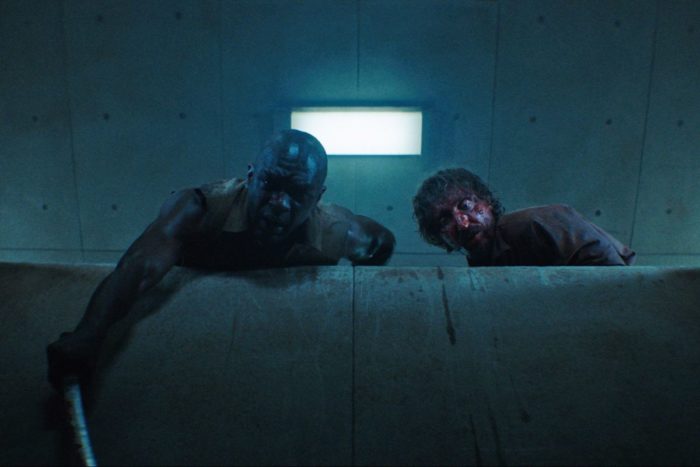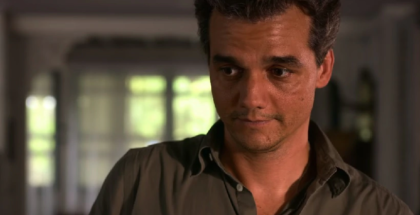Netflix UK film review: The Platform
Review Overview
Sophomoric allegory
6Cinematography
8Ultra-violence & acting
9Ian Winterton | On 28, Mar 2020
Director: Galder Gaztelu-Urrutia
Cast: Ivan Massagué, Zorion Eguileor, Antonia San Juan, Emilio Buale, Alexandra Masangkay, Zihara Llana
Certificate: 18
Watch The Platform online in the UK: Netflix UK
“There are three types of person: those at the top, those at the bottom, and those who fall.”
Spoken over a black screen, this statement goes on to be examined over The Platform‘s 90 unsettling, surreal, grisly and darkly funny minutes. The set-up is a Kafkaesque nightmare: a vertical prison of indeterminate height made up of one cell stacked upon another. Each identical cell contains two beds and, in the centre, a large rectangular hole into which glides the titular platform, upon which each day a banquet fit for a king is set. Stopping in each cell for only a few minutes, the inmates near the top feast well, but those on the lower levels get increasingly meagre pickings.
Our way into this terrifying world is Goreng (Ivan Massagué), a liberal and kind-hearted soul who’s volunteered (in order to get a free diploma, implausibly). Each inmate can choose one possession and most opt for weapons, but Goreng is content with his book by Cervantes. His first cellmate, frog-like killer Trimagasi (Zorion Eguileor), is typical of the other inmates – he curses those bastards above for gorging on food, but spits on the platform as it descends, reasoning that they would do the same to him if they were on a higher level.
A rather sophomoric allegory, then, in which society is reduced to a stratified class system that taps into a cinematic tradition dating back to Fritz Lang’s Metropolis and, less directly, to literature such as Dante’s Inferno. Metropolis was decried by many for its simplistic world-view – HG Wells’ famously considered it “silly” and “clichéd”, and director Lang tried to blame his co-writer ex-wife for what he dismissed as “a fairy tale” – but was rightly remembered for its groundbreaking effects and directorial verve. Similarly, The Platform is – ahem – elevated by its supremely talented debut director and a first-rate cast, art department and cinematographer.
Grimy, grim, gritty and naturalistic in style, although at the service of a fantasy world, The Platform immediately brings to mind the early work of Jean-Pierre Jeunet (particularly Delicatessen) or the lush but lurid nightmares of Peter Greenaway. As with Metropolis, it’s not concerned with internal logic – other than a vague hint of an outside Authority – there’s no real sense of the world that has resulted in such a cruel social experiment. The characters are mere cyphers created to explore the screenwriters’ central thesis.
However, if one can set aside the movie’s pretentious premise, there’s the engine of a traditional thriller underneath. Our hero, having been put through the wringer by encounters with various cellmates and those above and below, gives up on the idea that there’ll be an outbreak of “spontaneous solidarity” and sets out on a mission to persuade those above to save food for those below. Whether he can do this by argument or force, as he willingly travels down on the platform, is one of the few pleasingly ambiguous elements in what is otherwise an extremely didactic film.
Also keeping the audience engaged – those not sent scurrying for the off-switch – are the frequent bouts of gory violence. We’re treated to sustained beatings, beheadings and even cannibalism, all delivered with unflinching realism. It brings to mind some of Guillermo del Toro’s work, not least the scene in Pan’s Labyrinth (2006) in which The Platform’s lead Massagué encounters a wine bottle.
Despite sharing some aesthetic similarities with Pan’s Labyrinth, The Platform is lacking any of that film’s symbolic subtleties – its basic message is a naïve call for us all to, you know, share our food. A reasonable enough plea in a purpose-built metaphorical prison but, like the fairy tale of Metropolis, has only superficial relevance to the real world.
Another worryingly parallel with Metropolis is The Platform positing that the one man who can see what we have to do is an educated white guy whose only possession is a novel by Cervantes. The poor huddled masses can’t help acting like self-centred animals – only an educated liberal can possibly possess the required societal oversight.
This all, of course, speaks even louder given the film is released during a time of coronavirus, panic-buying and a reliance on those in authority. And, just as now, we somehow see others as the selfish looters, while failing to acknowledge those same impulses in ourselves as we place extra packets of toilet roll and pasta in our shopping trolleys.
This same lack of self-awareness dogs The Platform but, though at its most on-the-nose when scattering dollar bills down upon our hero as he sits amongst the left-over food, it’s nevertheless grippingly watchable.
None of this fully explains why it’s currently one of Netflix’s most watched movies, so we must assume that people are drawn, as they are to Soderbergh’s pandemic disaster film Contagion, to movies that don’t comfort us in these times, but speak to them. Its immediate relevance, unintentional of course, is striking: we’re all locked down, reliant on our fellow citizens not emptying the supermarket and at the mercy of the decisions of those who rule over us. It makes sense, then, but that an allegorical ultra-violent and grimly pessimistic arthouse movie – with subtitles! – has been a worldwide hit may well signal that the apocalypse is upon us.



















